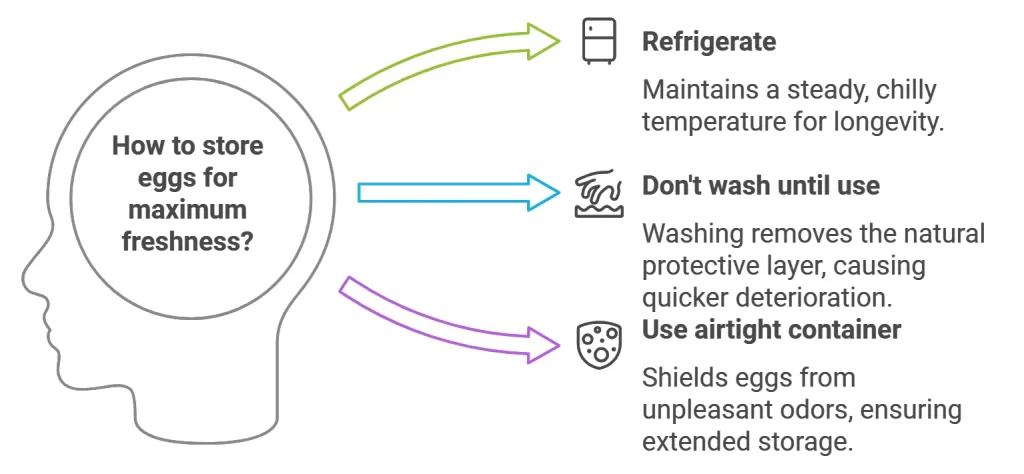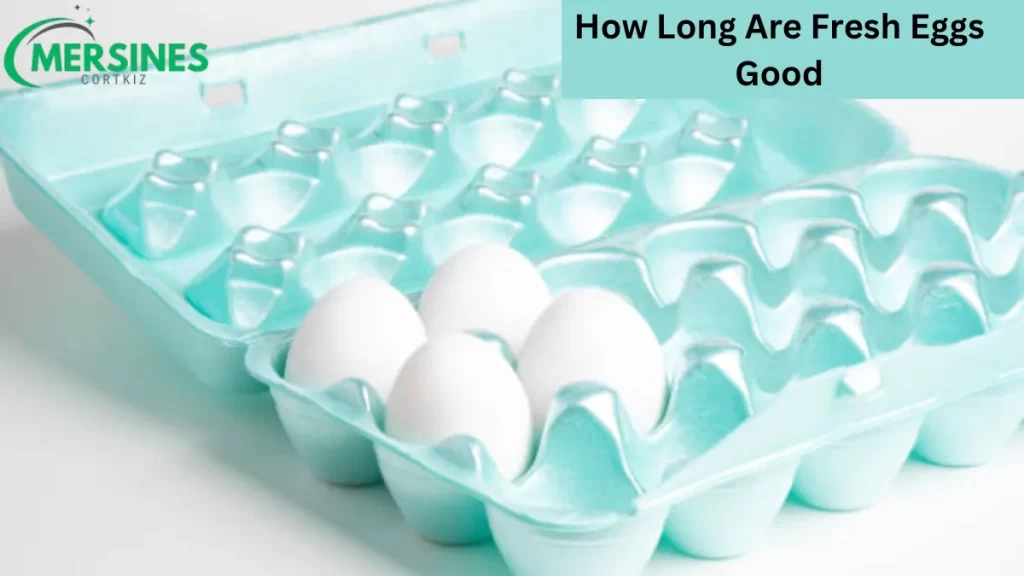Table of Contents
Has the question, How long are fresh eggs good for? ever crossed your mind?” You’re not alone! Fresh eggs are a common component in many homes, yet their shelf life is a mystery. This guide will uncover how long fresh eggs last and provide simple tips to keep them safe and tasty. Let’s dive into all you need to know about storing and checking your fresh eggs.
How Long Are Fresh Eggs Good For When Stored Properly?
When stored properly, fresh eggs can stay good for quite a while. Most fresh eggs can last 3 to 5 weeks in the fridge. Thanks to the cool temperature, eggs stored in the refrigerator maintain their quality longer. To ensure your eggs are as fresh as possible, place them in the central part of the fridge, not in the door, where temperatures fluctuate.
Signs of Fresh Eggs: How Can You Tell if They’re Still Good?
Understanding how long fresh eggs are good for means knowing when they’ve gone wrong. Here are some simple ways to tell if your eggs are still good
| Test | Description |
|---|---|
| The Float Test | Put an egg in a basin of water. If it sinks and lies flat, it’s fresh. If it floats, it may be spoiled and best to toss it. |
| The Sniff Test | Fresh eggs don’t have a strong smell. If you crack an egg and it has a sulfur-like or sour odor, it’s a sign it’s no longer fresh. |
| The Shell Check | Fresh eggs have smooth, intact shells. Cracks or rough textures can indicate that the egg’s quality is declining. |
By following these tips, you can feel confident knowing your eggs are still safe to eat.
How Long Are Fresh Eggs Good For Outside the Fridge?
Fresh eggs can be left outside the fridge longer than refrigerated eggs. In general, eggs can stay fresh at room temperature for about 1 to 2 weeks. However, eggs left unrefrigerated for too long are more prone to bacteria growth, so storing them in the fridge is safer if you don’t use them immediately.
How to Identify a Rotten Egg
If you’re uncertain about an egg’s age, try cracking it into a bowl. If it appears and smells fresh, it’s likely still safe. Trust your senses; you can always rely on the water test when in doubt.
How to Consume Too Many Eggs
In the spring, your hens might start laying more eggs than your family can keep up with. This is the perfect opportunity to share the abundance with friends, neighbors, and coworkers. Consider cutting cartons in half, filling them with eggs, and giving them as thoughtful gifts. A simple ribbon or twine around the cartons keeps them secure and adds a nice touch.
Also Read: The Truth About Fresh Eggs: How Long Are They Good For?
Safe Ways to Prepare and Enjoy Eggs

Although many consider this a recommendation, the FDA advises boiling eggs fully. These rules are designed mainly for large-scale food production, where eggs pass through a long and complex supply chain. However, when it comes to eggs from your backyard, you know exactly how they were produced, handled, and stored. While cooking food to a high degree is the safest method, we can agree it’s not always the most flavorful or nutritious way to enjoy eggs.
Are Runny Eggs Safe to Eat?
If you keep your kitchen spotless, separate any chicken mess from your home, keep egg boxes clean, store only spotless eggs, and wash your hands frequently, you may feel comfortable enjoying your eggs a bit runny. I love runny eggs, and so do my kids. My nephew prefers hard-boiled eggs, so we make those occasionally, but we’re primarily a soft-yolk family and manage to stay healthy. Ultimately, it’s about personal comfort and choice. If runny eggs don’t feel safe, cooking them thoroughly is OK. For us, though, there’s nothing like a breakfast plate with golden yolks ready to be enjoyed.
Also Read: can you catch boundary water fish with braided line?
Best Tips to Make Fresh Eggs Last Longer
The following helpful advice may help you keep your fresh eggs fresher for longer:
- Store Eggs in the Fridge: The best approach is maintaining a steady, chilly temperature to ensure longevity.
- Avoid Washing Until Ready to Use: Eggs deteriorate more quickly when washed because the natural protective layer is removed.
- Use an Airtight Container: Store eggs in the fridge in a well-sealed jar for more extended storage. This shields them from unpleasant odors.

Using these tips, you’ll help keep your fresh eggs safe and delicious.
Also Read: Wondering How Much Braces Cost? Uncover the Real Price!
Can You Eat Fresh Eggs Past the Expiration Date?

Egg cartons usually have a date printed, but fresh eggs often stay good past this date. The expiration date serves primarily as a guide, not an absolute rule. As long as the eggs pass the float and sniff tests, they are likely still safe to eat, even if they are a few days past the printed date.
Knowing how long fresh eggs are good for is vital to keeping your food safe and tasty. With proper storage and quick tests, you’ll enjoy your eggs for weeks and avoid waste. So next time you ask, “How long are fresh eggs good for?” you’ll know exactly what to do!

